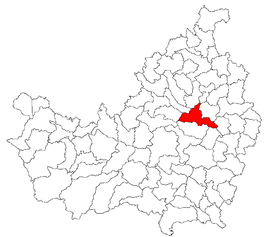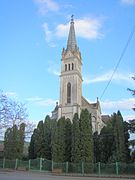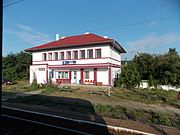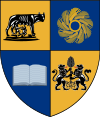| Bonțida | |
|---|---|
| Commune | |
 | |
 Coat of arms Coat of arms | |
 Location in Cluj County Location in Cluj County | |
 | |
| Coordinates: 46°54′N 23°48′E / 46.900°N 23.800°E / 46.900; 23.800 | |
| Country | Romania |
| County | Cluj |
| Established | 1263 |
| Subdivisions | Bonțida, Coasta, Răscruci, Tăușeni |
| Government | |
| • Mayor (2020–2024) | Emil Cărhaț (PNL) |
| Area | 80.38 km (31.03 sq mi) |
| Elevation | 296 m (971 ft) |
| Population | 5,191 |
| • Density | 65/km (170/sq mi) |
| Time zone | EET/EEST (UTC+2/+3) |
| Postal code | 407105 |
| Area code | +40 x64 |
| Vehicle reg. | CJ |
| Website | comunabontida |
Bonțida (Romanian pronunciation: [bonˈt͡sida]; Hungarian: Bonchida, pronounced [ˈbont͡shidɒ], transl. "Bonc's bridge"; German: Bonisbruck) is a commune in Cluj County, Transylvania, Romania. It is composed of four villages: Bonțida, Coasta (Gyulatelke), Răscruci (Válaszút), and Tăușeni (Marokháza).
Geography
The commune lies in the Transylvanian Plain, on the banks of the rivers Someșul Mic, Borșa, and Sicu. It is located in north-central Cluj County, 26 km (16 mi) northeast of the county seat, Cluj-Napoca, and part of the Cluj-Napoca metropolitan area. Bonțida is crossed by the national road DN1C [ro], which connects Cluj-Napoca to Baia Mare and the Romania–Ukraine border at Halmeu.
History
Bonțida is known as the home of a Baroque castle owned by the Bánffy family (of which Miklós Bánffy was a member); partly destroyed during World War II and neglected by the communist regime in Romania, it is currently being restored.
The Bánffy family had another castle in Răscruci, which is part of Bonțida and also the birthplace of poet Albert Wass. The Răscruci castle features in the reminiscences of an English governess, Florence Tarring, who worked for one of the branches of the Bánffy family during World War I (1914–1919).
Demographics
| Year | Pop. | ±% |
|---|---|---|
| 1850 | 3,643 | — |
| 1880 | 3,503 | −3.8% |
| 1890 | 4,203 | +20.0% |
| 1900 | 4,616 | +9.8% |
| 1910 | 4,809 | +4.2% |
| 1920 | 4,737 | −1.5% |
| 1930 | 5,009 | +5.7% |
| 1941 | 5,092 | +1.7% |
| 1956 | 5,658 | +11.1% |
| 1966 | 5,299 | −6.3% |
| 1977 | 5,543 | +4.6% |
| 1992 | 4,447 | −19.8% |
| 2002 | 4,722 | +6.2% |
| 2011 | 4,690 | −0.7% |
| 2021 | 5,191 | +10.7% |
| Source: Census data | ||
According to the census from 2002 there was a total population of 4,722 people living in this town; of this population, 65.07% were ethnic Romanians, 19.10% were ethnic Hungarians and 15.75% ethnic Romani. At the 2021 census, Bonțida had a population of 5,191, of which 73.8% were Romanians, 9.25% Hungarians, and 6.88% Roma.
Natives
- Ștefan Emilian (1819–1899), mathematician and architect
- Dorel Vișan (born 1937), actor
- Albert Wass (1908–1998), Hungarian nobleman
See also
References
- "Results of the 2020 local elections". Central Electoral Bureau. Retrieved 11 June 2021.
- "Populaţia rezidentă după grupa de vârstă, pe județe și municipii, orașe, comune, la 1 decembrie 2021" (XLS). National Institute of Statistics.
- Florence Tarring (2010). Elizabeth Watson (ed.). Miss Tarring's War. ISBN 978-1-921586-20-0.
- "Structura Etno-demografică a României".
- "Populația rezidentă după grupa de vârstă, pe județe și municipii, orașe, comune, la 1 decembrie 2021" (in Romanian). INSSE. 31 May 2023.
-
 Reformed church in Bonțida
Reformed church in Bonțida
-
 Roman Catholic church in Bonțida
Roman Catholic church in Bonțida
-
 Bonțida Bánffy Castle (partially restored)
Bonțida Bánffy Castle (partially restored)
-
 Bonțida train station
Bonțida train station
